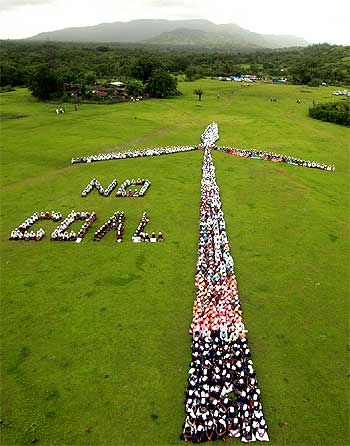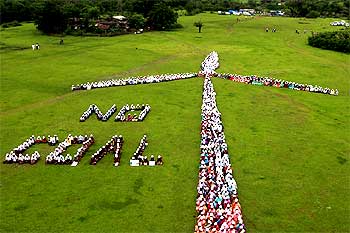They were demanding that the Maharashtra government should drop plans to build 10,000MW coal-fired thermal power plants in the region and explore renewable energy instead. The villagers said they were committed to fight the acquisition of their fertile land for coal-based power plants.
"We believe that the energy planned from these coal plants is dirty. It can come instead from clean alternatives like wind and solar energy, and by using energy more efficiently. We will not give up our land and our future to these mega power plants that will pollute our air, land, and water. We will not allow them to ruin our children's future by adding to the problem of climate change," said Dr Vishnu P Mhatre of the Naugaon Sangharsh Samiti, one of the organisations fighting for clean energy here.
The community is opposing plans to set up thermal power plants over 8,500 acres of fertile land. The companies involved are the Tata Power Company Limited (1,200MW) and the Maharashtra Energy Generation Limited, a Reliance subsidiary, (4,000MW) at Shahpur in Alibag. The Patni group (500MW) and the Ispat group (2,000MW) want to set up their plants in the adjacent Medekhad Khadi.
For more than four years, the villagers have been resisting attempts by the government and the companies to acquire their land. "We do not oppose production of energy. But, we strongly demand that the government of India should change its energy pathway and move towards decentralised renewable energy, which will be used locally for agro-based industries and domestic needs," said Satish Londhe, a resident of Alibag and state coordinator of the Shramik Mukti Dal.
Images: The life size human windmill to protest against the plans to construct 10,000 MW coal power thermal plants in Alibag, Maharashtra
Photographs: Greenpeace India
'Not a fight against development, it's just the opposite'
"In the current environment of global concern over climate change, we must also look critically at the operational efficiency of our power plants and increase energy efficiency in all sectors. This will ensure a dramatic reduction in our energy demand," Ramdas asserted.
Maitree Dasgupta, Climate Campaigner with Greenpeace India, said, "This protest is a sign of popular opposition fomenting against coal in India, which will only grow. This is not a fight against growth or development. It is just the opposite. It is a fight for building energy infrastructure for the future instead of relying on dinosaur technologies. India can get 35% of its power from renewable energy by 2030. We have the ability and technical capacity; we only need the political will."
Greenpeace India is demanding that Prime Minister Manmohan Singh put in place a National Renewable Energy Bill no later than 2010, which would enable a shift towards a more sustainable energy pathway. This implies that the draft bill be made public this year for debate before placing it for parliamentary approval. It would also provide a framework for the Solar Mission and show that India is serious about the mission. More than 50,000 Indians have already signed Greenpeace India petitions demanding a response on this from Manmohan Singh.
The construction of the plants was to be started in 2007, but the land accusations are not complete yet and no construction has begun. Majority of people have denied giving up the land.



article